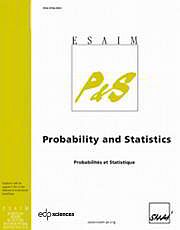Crossref Citations
This article has been cited by the following publications. This list is generated based on data provided by
Crossref.
Scricciolo, Catia
2014.
Adaptive Bayesian Density Estimation in Lp-metrics with Pitman-Yor or Normalized Inverse-Gaussian Process Kernel Mixtures.
Bayesian Analysis,
Vol. 9,
Issue. 2,
Gassiat, Elisabeth
and
Rousseau, Judith
2016.
Nonparametric finite translation hidden Markov models and extensions.
Bernoulli,
Vol. 22,
Issue. 1,
Bochkina, Natalia
and
Rousseau, Judith
2017.
Adaptive density estimation based on a mixture of Gammas.
Electronic Journal of Statistics,
Vol. 11,
Issue. 1,
Levrard, Clément
2018.
Sparse oracle inequalities for variable selection via regularized quantization.
Bernoulli,
Vol. 24,
Issue. 1,
Zhang, Fengshuo
and
Gao, Chao
2020.
Convergence rates of variational posterior distributions.
The Annals of Statistics,
Vol. 48,
Issue. 4,
Saha, Sujayam
and
Guntuboyina, Adityanand
2020.
On the nonparametric maximum likelihood estimator for Gaussian location mixture densities with application to Gaussian denoising.
The Annals of Statistics,
Vol. 48,
Issue. 2,
Gadat, Sébastien
Kahn, Jonas
Marteau, Clément
and
Maugis-Rabusseau, Cathy
2020.
Parameter recovery in two-component contamination mixtures: The $L^{2}$ strategy.
Annales de l'Institut Henri Poincaré, Probabilités et Statistiques,
Vol. 56,
Issue. 2,
Lehéricy, Luc
2021.
Nonasymptotic control of the MLE for misspecified nonparametric hidden Markov models.
Electronic Journal of Statistics,
Vol. 15,
Issue. 2,
Hu, Zhaolin
Sun, Wenjie
and
Zhu, Shushang
2022.
Chance constrained programs with Gaussian mixture models.
IISE Transactions,
Vol. 54,
Issue. 12,
p.
1117.
Nguyen, TrungTin
Nguyen, Hien Duy
Chamroukhi, Faicel
and
Forbes, Florence
2022.
A non-asymptotic approach for model selection via penalization in high-dimensional mixture of experts models.
Electronic Journal of Statistics,
Vol. 16,
Issue. 2,
Lecestre, Alexandre
2023.
Robust estimation in finite mixture models.
ESAIM: Probability and Statistics,
Vol. 27,
Issue. ,
p.
402.
Moss, Daniel
and
Rousseau, Judith
2024.
Efficient Bayesian estimation and use of cut posterior in semiparametric hidden Markov models.
Electronic Journal of Statistics,
Vol. 18,
Issue. 1,
Wei, Jinxiang
Hu, Zhaolin
Luo, Jun
and
Zhu, Shushang
2024.
Enhanced branch-and-bound algorithm for chance constrained programs with Gaussian mixture models.
Annals of Operations Research,
Vol. 338,
Issue. 2-3,
p.
1283.


